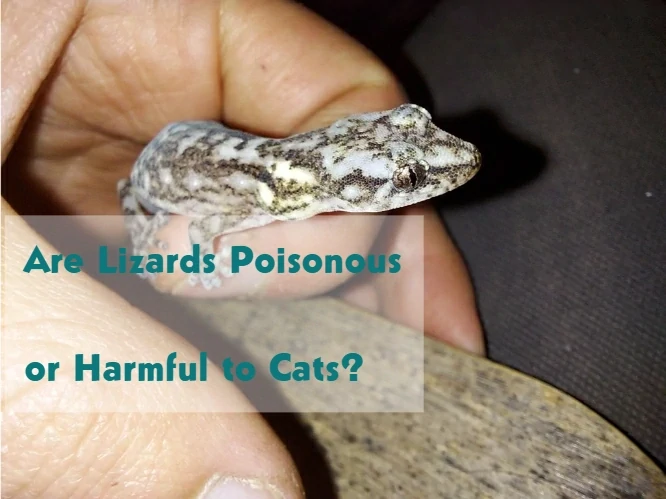If you’ve ever had a cat, you know how easily they get hooked on anything that moves. A shadow flickers, a bug flies by, or a tiny lizard darts across the floor, and suddenly your lazy cat turns into a full-on hunter.
One second it’s just grooming, the next it’s crouched low, eyes locked on, tail twitching. But what happens if your cat actually catches a lizard? And maybe even eats it? You’re probably wondering: are lizards poisonous to cats?
No, lizards are generally not poisonous to cats, and a quick lizard chase or nibble usually won’t cause any harm. The common house lizards, geckos, skinks, and anoles you see around your home or yard are harmless. They don’t have venom or toxins. However, eating one can sometimes upset a cat’s stomach or cause mild illness; and in rare cases, it can lead to something more serious if bacteria or parasites are involved.
Still, cats are hunters. They might eat it, and that’s where things can get tricky. Some lizards carry bacteria or tiny parasites that can upset your cat’s stomach.
Usually it’s just a day or two of soft stool or vomiting, but sometimes it can get worse.
Cats Are Natural Hunters and Lizards Are Perfect Targets
Cats are born hunters. Even indoor cats can’t help but chase things that move. A lizard skittering across the floor is basically a live toy they can’t resist.
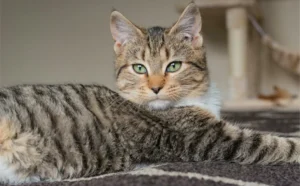
The tricky part is, cats don’t just play. Once they catch something, they often bite or eat it.
And even though most lizards are safe, they’re still wild animals.
Their skin and insides can carry bacteria or tiny parasites that might not sit well in your cat’s stomach.
What Happens If a Cat Eats a Lizard?
Most of the time, it’s nothing serious. Your cat might throw up once, have soft poop for a day, or act a little off before going back to normal.
But sometimes, depending on the lizard or where you live, eating one can cause more noticeable problems. Signs to watch for include:
-
Drooling or foaming at the mouth
-
Vomiting
-
Diarrhea
-
Loss of appetite
-
Acting weak or tired
These usually mean your cat’s body is reacting to bacteria or mild toxins from the lizard.
It’s rarely dangerous, but it can make your cat uncomfortable for a day or two.
Which Lizards Could Actually Be Dangerous?
Almost all lizards your cat will see are harmless. There are a few exceptions, mostly in parts of the U.S. and Central America.
The Gila monster and the Mexican beaded lizard are the only venomous lizards in the world. They have venom in their bite.
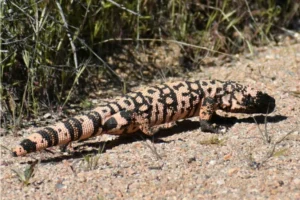
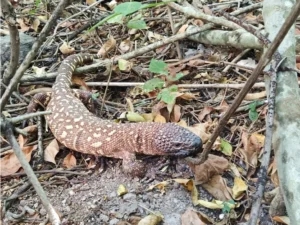
They don’t go looking for trouble, but a curious cat that tries to paw at one could get bitten.
A bite from one of these lizards would hurt, cause swelling, drooling, and maybe shock. But encounters like this are super rare.
These lizards live in dry deserts, move slowly, and spend most of their time hiding underground.
For most cat owners, you won’t have to worry about them.
House Lizards, Skinks, and Geckos Are Safe, but Can Upset Stomachs
If you live somewhere warm, you’ve probably seen small lizards like house geckos or skinks crawling up walls or hanging around porch lights. Cats love to chase them.
These lizards aren’t poisonous. But they can still upset a cat’s stomach because their skin and insides can carry bacteria, especially Salmonella.
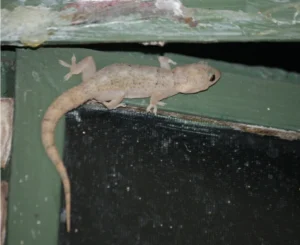
When a cat bites or swallows one, the bacteria can cause temporary problems like vomiting or diarrhea. It’s rarely serious, but it can make your cat feel sick for a while.
It’s also possible for cats to get tiny worms from eating wild lizards. The most common type lives in certain reptiles.
When cats eat infected lizards, the worms can get into the cat’s bile ducts and cause inflammation; a condition called lizard poisoning syndrome.
Lizard Poisoning Syndrome in Cats
This might sound scary, but it’s about parasites, not poison.
“Lizard poisoning syndrome” happens when a cat eats a lizard carrying trematode parasites (a type of fluke). Once inside, the parasites can infect the liver, pancreas, or bile ducts.
Symptoms usually show up in a few days and can include:
-
Persistent vomiting
-
Yellow eyes or gums (a sign of jaundice)
-
Loss of appetite
-
Weakness or dehydration
It’s not common, but when it happens, it can be serious. The only way to know is a vet exam and lab tests. With proper care, most cats recover.
Still, it’s a good reason to stop your cat from snacking on lizards.
Why Lizards Can Upset a Cat’s Stomach
Even if the lizard doesn’t carry parasites, cats’ stomachs aren’t made for eating them. The scales, bones, and rough skin can be hard to digest and can irritate the stomach.
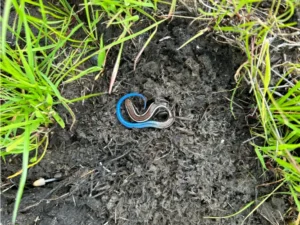
So when your cat eats one, you might see gagging or vomiting. It’s not poison (it’s just hard on their stomach.
Think of it like eating something tough and gritty) your body just wants it out.
What About Biting, Not Eating?
If your cat only bites or licks a lizard, that’s even less of a problem. Lizards don’t have dangerous toxins on their skin. Their mild defensive secretions are mostly harmless.
At most, your cat might drool or paw at their mouth for a few minutes because of the weird taste. It’s unpleasant, not poisonous.
Just wipe their mouth with a clean, damp cloth and give fresh water. It should pass quickly.
How to Tell If a Lizard Made Your Cat Sick
If you think your cat ate a lizard, watch them for a day or two. Look for:
-
Repeated vomiting or gagging
-
Loss of appetite
-
Drooling or foam around the mouth
-
Weakness or wobbling
-
Yellow eyes or skin
If you see any of these, call your vet. They might suggest blood tests or an ultrasound to check for liver infection or parasites.
Most of the time, cats just get a mild stomach upset and recover on their own.
What You Should Do Right After Your Cat Eats a Lizard
You don’t need to panic, but you should:
-
Take note of what the lizard looked like (color, size, shape). A quick photo helps your vet if problems appear later.
-
Wipe your cat’s mouth with a damp cloth.
-
Watch for sickness over the next day or two.
-
Keep your cat hydrated. Offer clean water or wet food.
If they seem normal after a day, you can relax. It’s usually a one-time adventure they’ll probably repeat someday.
Can Lizards Bite or Hurt Cats?
It’s not common. But if a cat corners a large lizard, the lizard might try to defend itself with a quick nip.
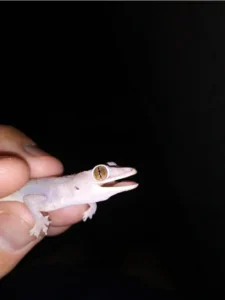
A small house lizard’s bite is too weak to even break the skin. Larger reptiles like iguanas or monitors can bite harder, but it’s more defensive than an attack.
If your cat gets bitten, clean the wound gently with warm water and watch for swelling. If it looks red or infected after a day, call your vet.
How to Stop Cats From Hunting Lizards
You can’t erase their hunting instinct, but you can make it less likely. Try this:
-
Keep your cat indoors, especially during warm parts of the day when lizards are active.
-
Give them lots of toys that move, like feather wands or laser pointers.
-
Close windows or vents where lizards might slip in.
-
Feed your cat well so they’re less motivated to hunt “extra snacks.”
A happy, well-fed cat with lots of toys is much less likely to go after real animals.
Are Lizards Harmful in Other Ways?
Besides parasites and bacteria, lizards don’t really harm cats. They don’t spread serious diseases directly.
But a cat that often eats lizards could get sick over time from bacteria or parasites. One lizard isn’t dangerous, but making it a habit isn’t ideal.
It’s better to gently discourage hunting when you can.
When to Call the Vet
Most lizard encounters are fine, but call your vet if you notice:
-
Persistent vomiting
-
Loss of appetite
-
Yellow eyes or gums
-
Weakness or dehydration
-
Signs of pain or distress
Bring a photo of the lizard if possible. It helps your vet figure out what your cat ate and how to treat it.
Conclusion
So, are lizards poisonous to cats? No. Most lizards are completely safe.
Your cat might chase, bite, or even eat a small lizard now and then, and usually, it’s nothing serious. The real risks aren’t from poison but from bacteria or parasites that can make your cat feel sick for a short time.
With a little care, most cats recover quickly and go back to being their curious selves.
Still, it’s best to prevent it when you can, for your cat’s health and for the lizards. They’d much rather be outside catching bugs than starring in your cat’s next hunting adventure.
Hi, my name is Ezra Mushala, i have been interested animals all my life. I am the main author and editor here at snakeinformer.com.

